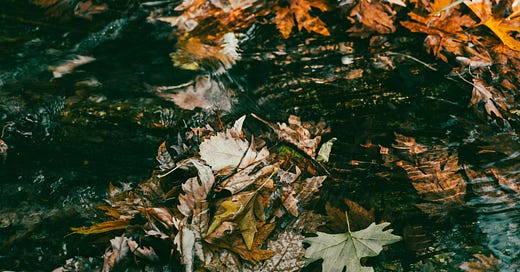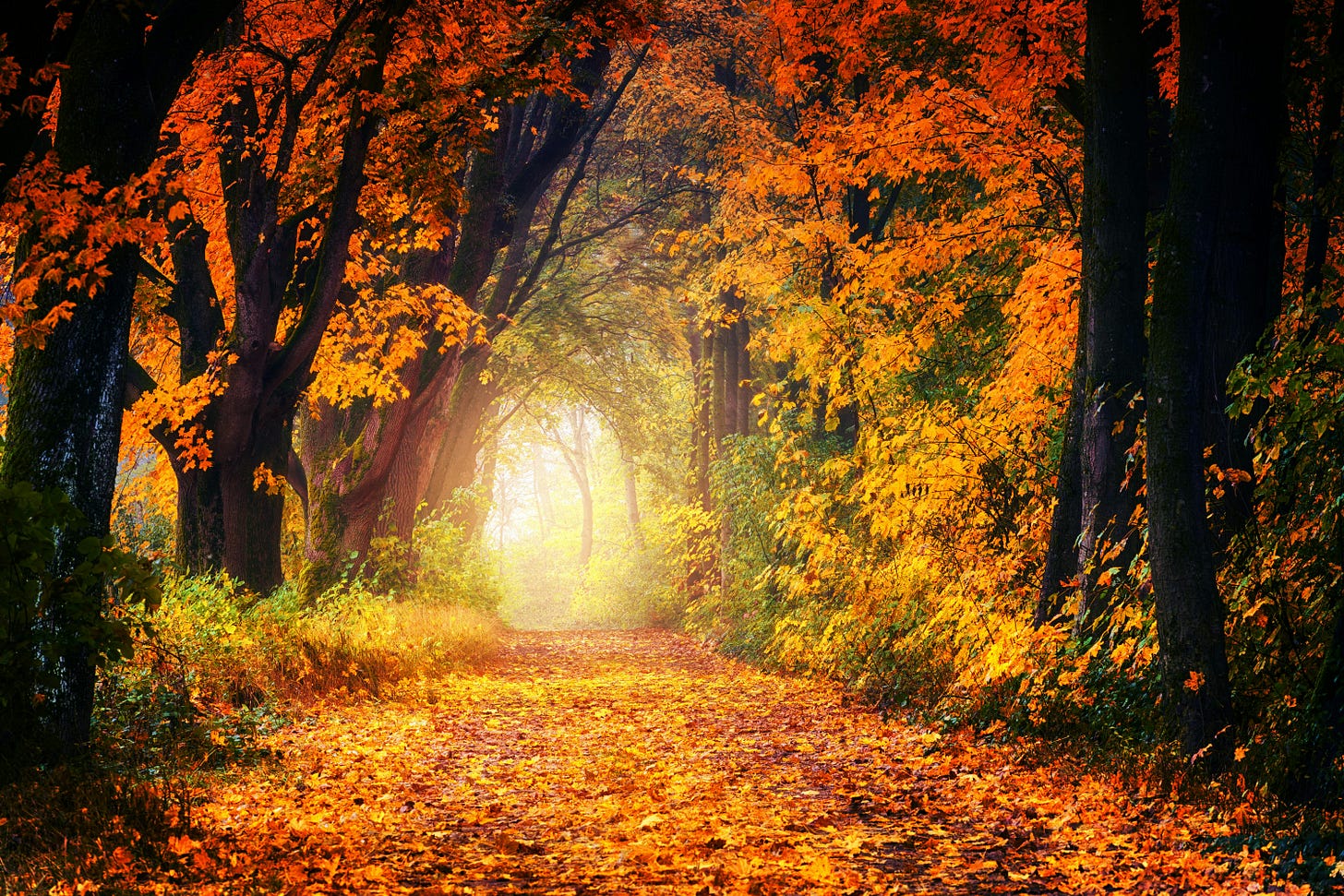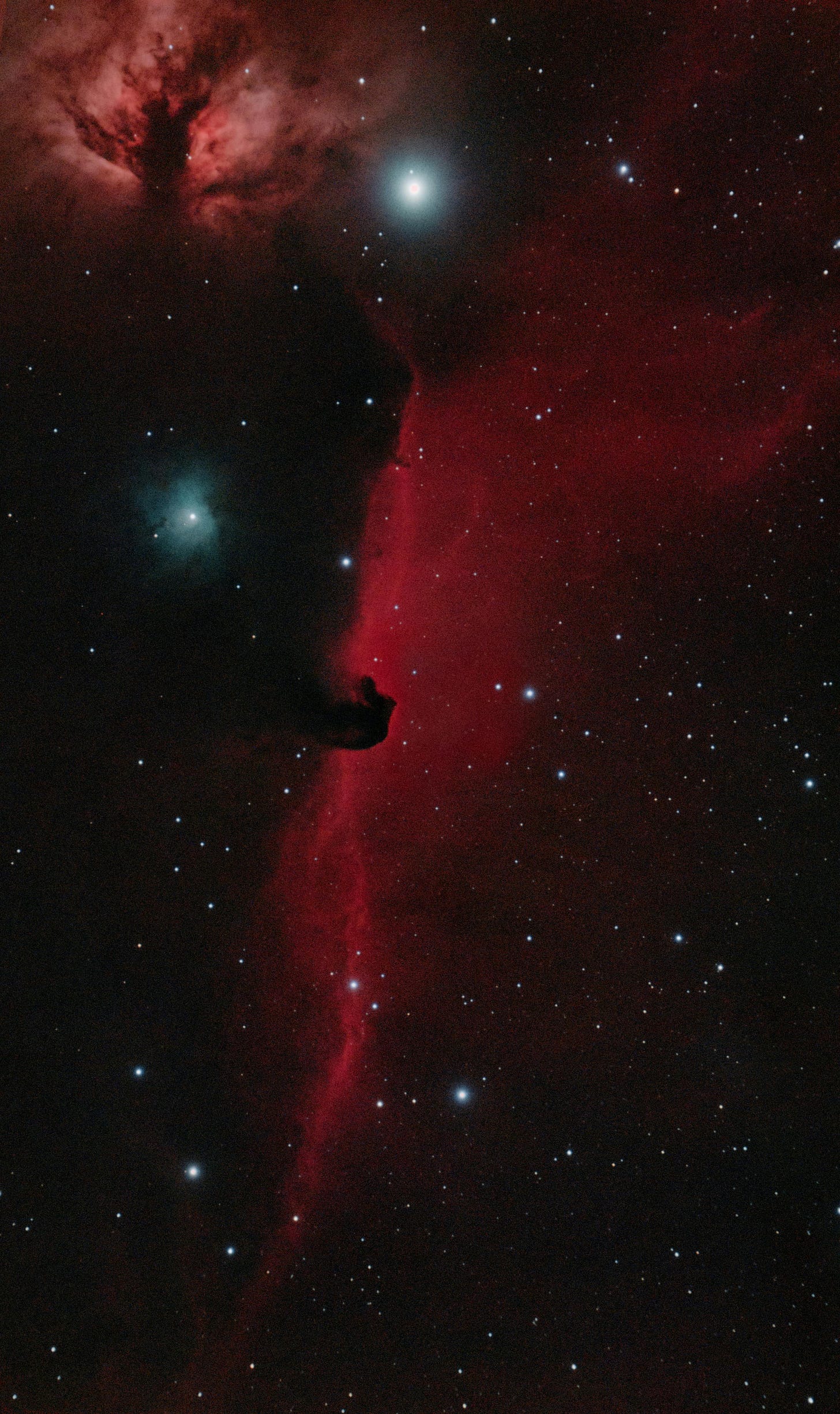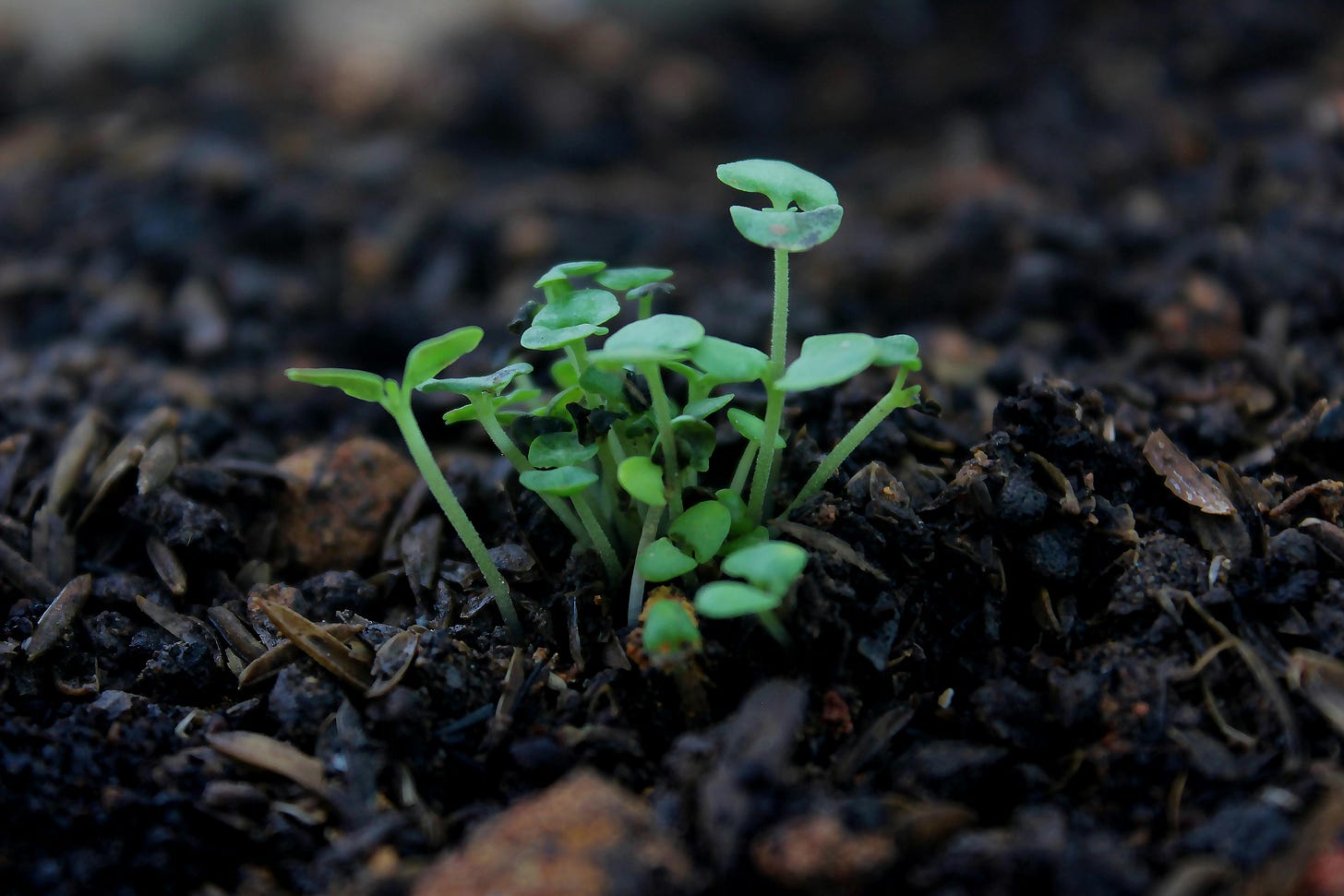God is death, and what death becomes.
Poem: A forest once
I thought I dreamt of a forest once, darkfully green, a place where the wind could hide and becoming lost we would find ourselves. I thought I dreamt of fallen leaves, of decay enriching the soil―life rising from the sweet sting of impermanence. But now, encased by undying concrete, I think of the beginnings that will never come because of the endings that cannot. ©Gideon Heugh, Rumours of Light
What you once held as vital
‘We were promised sufferings. They were part of the program. We were even told, “Blessed are they that mourn,” and I accept it. I've got nothing that I hadn't bargained for. Of course it is different when the thing happens to oneself, not to others, and in reality, not imagination.’
―C.S. Lewis, A Grief Observed
When was the last time that you died?
I’ve done it a number of times. Some deaths that were willing releases; others that were a cold and shocking plummet.
I died when my heart first broke. I died when my father told me he’d be leaving our family. I died when I became a parent and set so much of my life aside—gladly, wonderfully, but not un-grievingly—for the sake of my daughter.
I am dying at the moment. As I am writing this, my home is being prepared for sale. The carpet on which my little girl took her first steps is being washed so that it will look presentable for the strangers who will soon own it. The view out of my study window—birch, sycamore, beech, pine, rowan, ivy—will before long be consigned to the bittersweetness of memory.
Life is full of these ways we die, small and large. Doubtless you can think of your own: those moments where you have to leave something or someone behind; those moments you have let go of, or had stripped from you, what you once held as vital.
Endings are inevitable. God is death, and what death becomes—the opening line of the eponymous poem from Naming God, my third poetry collection.
So, what does it become?
The dark seed of spring
‘So praise Him in the old and mouldering,
In pale gold leaf-fall losing shape and edge,
In mottled compost rustling and rich,
From which the stuff of life is still unfolding.’
—Malcolm Guite, In praise of decay
Autumn is wrapped around us; the nights have been slowly gathering favour.
The weather is beginning to whip at us; the cold is creeping in; the year is tilted now towards conclusions. Knowing what is drawing near, the season has been offering its consolations: the mahogany shine of chestnuts; mushrooms gracing the damp earth; comforts of red, orange and gold leaves sweeping canopy and ground.
We bring our own comforts, too: mist-breathed walks; warm soup; candles, and hot chocolate, and the sweet wet smoke of a bonfire.
Albert Camus said famously (and gorgeously) that autumn is ‘a second spring when every leaf’s a flower.’ Autumn is a time of falling, of fading, of a growing sense of un-growth; yet there is nonetheless a deep generativity to it. Autumn is not merely a second spring, it is the dark seed of spring itself. All of this letting go prepares the way for the rising up that is to come.
Loss has a potency of its own; there is a fruitfulness to decay. That is not to say we romanticise our own losses, or try to justify all suffering by falsely ascribing meaning to it. Some deaths hurt, and that’s all there is to it; some things require no more explanation that the endless synonyms of pain that we mutter over them.
Nonetheless, we cannot say that God is merely springfulness. We cannot say that Spirit is merely renewal. To do so would be to ignore… everything.
The pattern of existence
‘Very truly I tell you, unless a grain of wheat falls to the ground and dies, it remains only a single seed. But if it dies, it produces many seeds.’
—John 12:24
There is an uncomfortable, yet, once we get through it, liberating truth about the way existence works.
Death is the great and hard inevitability, yes, but so is life, because as much as life leads to death, death leads to life. We would prefer it not be so, but there cannot be one without the other. It is the most central of cycles, essential to the way the entire universe functions—from the cosmic to the earthy and human.
The night sky is so bright with wonder because of endings; endings that formed you, too. Stars are born in the fallen bodies of other stars, and the ejections from those stellar deaths formed the elements that created you and me. We would not exist without the death of stars.
A death more all-consuming than we could imagine lies at the centre of our galaxy, the Milky Way: a supermassive black hole, its event horizon a constant scream of the light that cannot escape it. Yet this cosmic doom is part of what holds our galaxy together.
We do not like the gravity of life, its heaviness, yet without it there would be no life at all.
Within your body, one million cells are dying every second. That sounds rather alarming, but it would be far more alarming if it wasn’t happening. Because without all that dying, you’d be dead. Some of the world’s most grim diseases come about when something goes wrong with the body’s ability to recycle itself.
The leaf-fall that we see all around today will go on to form the ground beneath our descendant’s feet. Soil only exists because of decay, which means food only exists because of decay, which means we only exist and are sustained because of decay.
Eden was a paradise, but there must have been death there—if not, there would have been no soil for the flowers to grow in. Without endings, there would be no garden for God to walk through in the cool of the evening.
This is what is so troubling about plastic. It doesn’t die. It doesn’t rot. And so it does not allow other things to become.
Endings are the engine of growth. It is not hard to follow the thread to the spiritual implications.
Symbols of fertile desolation
‘You only know what life means once you know what death means.’
—Richard Rohr
All of this ought to be especially obvious to Christians. But then, Christians have built an entire religion upon ignoring what ought to be obvious about their faith.
Jesus did not talk about worshipping him, or being in a relationship with him. He spoke of following him—of practicing the kind of life he lived and implementing the teachings he taught, the central tenants of which were nonviolence, rejection of wealth, forgiveness, non-judgement, radical inclusion… and dying.
Have you ever thought about how strange it is that the central symbol of Christianity is an instrument of death? Why not an open tomb? Or a ray of light? Or frankly any symbol other than one of catastrophic loss?
Why? Because of what it leads to.
The symbol of Christianity does not need to be one of resurrection, because resurrection is inevitable. It takes care of itself. But such beginnings can only take place when preceded by endings. ‘Unless a seed falls to the ground…’
The endings we experience in life can be agents of transformation. Without them, life is saccharine and void of wisdom. Without the sweet leaf-rot that comes from letting go, there is no fertility, there is no growth.
Our problem is that we want life without death. What resurrections have we failed to be witness to because of our refusal to put something in the ground?
Never failing, never losing, never letting go—this creates plastic people, anti-life.
Such a cortège of loss
‘Someone I loved once gave me
a box full of darkness.
It took me years to understand
that this, too, was a gift.’
―Mary Oliver, The uses of sorrow
Life is hard. Unquestionably, and, at times, unconquerably. We must let the hurt hurt, and not attempt to cover it with platitudes.
And yet. As I wrote last week in the section on anakephalaiosis, our losses can be rewritten. Not glossed over, not anesthetised, not changed in and of themselves, but woven into a larger story.
The ending still stings, we still grieve, but we see it in the context of what came after.
A friend of mine, after reading through my poetry books, expressed their sympathy that I had clearly experienced so much sorrow in my life. Much of my work is indeed tinged with sadness. But I do not regret it, or wish my life were different. What I have become is because of what I have had to leave behind. I would not be who I am today without such a cortège of loss―we are who we are because of these bitter and exquisite mortalities.
Gideon x
A little note to say…
I won’t be putting The Green Chapel behind a paywall. I believe that poetry and ideas about God and other beautiful things should be as accessible to as many people as possible. Having said that, I am an independent artist, so I need all the support I can get! If you’re able to make a small contribution to my work, I’d be incredibly grateful. It will help me to keep doing what I’m doing, and keep it free. Just click the button below. Thank you, GH.








Your words are profound, Gideon. Truly. So much wisdom here. As I read these words, more than once I exclaimed “wow” aloud. As someone who had experienced a lot of loss in my life, this really spoke to my soul and brought me to healing tears. Thank you. From the bottom of my heart. Thank you.
Okay, big deep breath. I'm clinging to so many things I need to drop, my hands are full and I'm still trying to gather more, I'm waiting, it seems, for another way, any other way, an off ramp to bypass the death, a hack, a short cut please. I want to experience growth and abundance and release without the sweet leaf-rot you and the trees are whispering to me about. I'll hold this with me as a reminder to keep feeling my way through the thick and murky mystery of loss, "Never failing, never losing, never letting go—this creates plastic people, anti-life."
Your words are full and rich and incredibly moving. Keep writing!